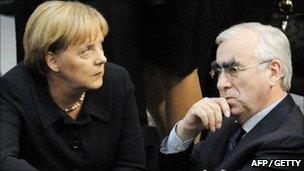'Crisis? What crisis?' says euro architect
- Published

They call him "Mr Euro".
Theo Waigel, German finance minister in the 1990s, was a key architect of the euro - and grave-digger for the Deutschmark.
But as the markets turn the screw on the eurozone, he insists the "euro crisis" is no more than media hysteria and political ineptitude.
"In '92 and '93 we had big crises," he says.
"The central banks had to take more than $300bn (£200bn) to intervene in other countries and the Bundesbank gave other central banks in Europe 95bn Deutschmarks.
"Nobody can say we had no crises before. But we were able not to inform everyone and not to tell the press something every day. We were able to be silent."
Waigel has aged well. His trademark eyebrows are just as black and bushy as they were in his heyday when he crafted the Stability and Growth Pact and Maastricht criteria that were supposed to ensure eurozone countries kept their budgets under control.
This, he concedes, was not strong enough. "I was very disappointed with my successors," he says.
The Social Democrat-Green coalition government broke the pact and avoided sanctions - setting a precedent for others to follow.
We are speaking at his dining room table. It has been a 90-minute drive from Munich, through dark pine forests, to a small village overlooked by the hazy blue peaks of the Alps.
The white-tiled floor and white walls give the room a Mediterranean feel on a day when the mercury nudges 40C.
"[My son] said to me: 'Is it true you are the father of the euro?'" says Mr Waigel. "I said: 'That's what they say'. 'Well,' he answered, 'I don't want to be its brother!'"
Waigel gives a belly-laugh at the euro's troubles, but he has no time for those who want the Deutschmark back. "This is not realistic," he says dismissively.
"If we had the D-Mark today, we'd have the same situation as 1995. We had the strongest D-Mark, but we lost 1% of growth and one million jobs. That would be the consequence."
Press 'hysteria'
But is the euro as helpful for countries such as Greece and Spain?
"Absolutely," says Waigel. "It's been the umbrella for them. In former times they had to devalue. Every devaluation was a catastrophe for them."
Mr Waigel can seem as if he is driven by a vested interest, defending the currency he invested his entire political capital helping to create.
But many say that recent measures - including a 1tn-euro (£850bn) bail-out fund agreed over a single weekend of crisis talks in Brussels - are just a reaction to a currency zone in danger of falling apart.
'It's hysteria in the press," he answers with a poker face.
"I think the countries - also Germany - have to explain to the people that for the next 10 to 15 years, the main problem is to reduce deficits and debts. If people are not ready to accept such measures, then their country has to leave the eurozone."
Mr Waigel recalls fondly his time as finance minister and his relations with British counterparts including Nigel Lawson, Ken Clarke and Gordon Brown.
He even allows himself a rhetorical flourish direct from the 1980s:
"There is no alternative. To solve the global financial crisis with 20 or 30 currencies in Europe would not be possible. How would it be possible to have co-operation between all these currencies and the Fed or the central bank of China?
"My old friend Henry Kissinger joked, 'What's the telephone number for Europe?' For finance, we have the telephone number.
"It goes to Jean-Claude Trichet, governor of the European Central Bank, in Frankfurt. And he has done an excellent job in the best tradition of the Deutsche Bundesbank (German Federal Bank) in former times."
Hear the full report on Radio 4's The World At One, 1300 BST, Monday 19 July 2010 and afterwards on iPlayer.
- Published16 July 2010
- Published8 June 2010
- Published23 May 2010
- Published20 May 2010
- Published17 May 2010
- Published29 March 2010
- Published5 August 2009